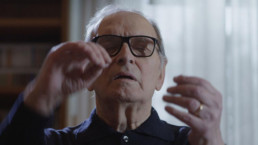Ennio
di Giuseppe Tornatore
Regia / Director: Giuseppe Tornatore
Interpreti / Cast: Lina Wertmüller, Marco Bellocchio, Joan Baez, Liliana Cavani, Giuliano Montaldo, Vittorio Taviani, Nicola Piovani, Roberto Faenza, Silvano Agosti, Franco Piersanti, Franco Migliacci, Miranda Martino
Soggetto / Screenplay: Giuseppe Tornatore
Fotografia / Cinematography: Fabio Zamarion, Giancarlo Leggeri
Montaggio / Editing: Massimo Quaglia, Annalisa Schillaci
Musica / Music: Ennio Morricone
Produttore / Producer: Gabriele Costa, Gianni Russo
Produzione / Production: Piano B Produzioni
Co-produttori: Peter De Maegd, San Fu Maltha e Tom Yoda
Co-produzione: Gaga, Potemkino, Terras
Distribuzione / Distribution: Lucky Red
Distribuzione estera / World Sales: Piano B Produzioni, Picture with the support of Fonds MIBACT direzione generale cinema e Eurimages
Paese / Country: Italia, Belgio, Giappone / Italy, Belgium, Japan
Anno / Year: 2021
Durata / Running Time: 150’ – Documentario / Doc
“Ennio” è il ritratto a tutto tondo di Ennio Morricone, il musicista più popolare e prolifico del ventesimo secolo, il più amato dal pubblico internazionale, due volte premio Oscar, autore di oltre cinquecento colonne sonore indimenticabili. Il documentario lo racconta attraverso una lunga intervista di Tornatore al Maestro, testimonianze di artisti e registi, come Bernardo Bertolucci, Giuliano Montaldo, Marco Bellocchio, Dario Argento, i fratelli Taviani, Carlo Verdone, Barry Levinson, Roland Joffé, Oliver Stone, Quentin Tarantino, Bruce Springsteen, Nicola Piovani, Hans Zimmer e Pat Metheny, musiche e immagini d’archivio. “Ennio” è anche un’indagine volta a svelare ciò che di Morricone si conosce poco. Come la sua passione per gli scacchi, che forse ha misteriosi legami con la sua musica. Ma anche l’origine realistica di certe sue intuizioni musicali come accade per l’urlo del coyote che gli suggerisce il tema de Il buono il brutto, il cattivo, o il battere ritmato delle mani su alcuni bidoni di latta da parte degli scioperanti in testa a un corteo di protesta per le vie di Roma che gli ispira il bellissimo tema di Sostiene Pereira. Un’attitudine all’invenzione che trova conferma nel suo costante amore per la musica assoluta, e la sua vocazione a una persistente sperimentazione.
“Ennio” is a well-rounded portrait of Ennio Morricone, the most popular and prolific film composer of the 20th century, the one most loved by the international public, a two-time Oscar winner and the author of over five hundred unforgettable scores. The documentary presents the Maestro through a long interview conducted by Tornatore, testimonies from artists and directors, including Bernardo Bertolucci, Giuliano Montaldo, Marco Bellocchio, Dario Argento, the Taviani brothers, Carlo Verdone, Barry Levinson, Roland Joffé, Oliver Stone, Quentin Tarantino, Bruce Springsteen, Nicola Piovani, Hans Zimmer and Pat Metheny, music and archive footage. “Ennio” also sets out to reveal the less well-known side of Morricone. Such as his passion for the game of chess, which may have mysterious links with his music. As well as the origin in real life of some of his musical intuitions, like the howl of the coyote that suggested to him the theme of Il buono il brutto, il cattivo (The Good, the Bad and the Ugly), or the rhythmic drumming of the hands on tin cans by strikers at the head of a protest march through the streets of Rome that inspired the beautiful theme of Sostiene Pereira (According to Pereira). A propensity for invention that found confirmation in his constant love of absolute music, and his bent for persistent experimentation.
Giuseppe Tornatore (Bagheria, 1956) Inizia giovanissimo a lavorare nel campo della fotografia, ricevendo diversi riconoscimenti dalle riviste fotografiche nazionali. Con una filodrammatica a sedici anni mette in scena due opere di Pirandello e De Filippo. Le prime realizzazioni cinematografiche, di genere documentaristico, tra cui “Il carretto” sulle tradizioni popolari isolane, lo portano nel 1979 a collaborare con la Rai per cui dirige diverse produzioni televisive e cinematografiche sulla Sicilia e i suoi personaggi di rilievo: “Diario di Guttuso”, “Ritratto di un rapinatore””Scrittori siciliani e cinema: Verga, Pirandello, Brancati, Sciascia”. Nel 1982 con “Le minoranze etniche in Sicilia” vince il premio per il miglior documentario al Festival di Salerno. Nel 1984 partecipa alla produzione (è il presidente della coop. CLCT), alla sceneggiatura e alla regia di “Cento giorni a Palermo” di Giuseppe Ferrara e due anni dopo si lancia nella sua prima regia con “Il camorrista”, vincendo un Nastro d’argento e il Globo d’oro della stampa estera in Italia come miglior regista emergente. La consacrazione arriva nel 1988 con il suo secondo film, “Nuovo cinema paradiso”, con cui vince diversi premi tra cui il Gran Premio speciale della giuria a Cannes, il Golden Globe della stampa estera a Los Angeles e, soprattutto, l’Oscar come miglior film straniero. Il suo palmares è molto ricco: – “Stanno tutti bene” – Premio OCIC (Critica Ecumenica Internazionale) a Cannes 1990 e Nastro d’argento per miglior soggetto originale; “Una pura formalità” – Ciak d’oro per miglior montaggio;- “L’uomo delle stelle” – Gran Premio speciale della Giuria alla 52 Mostra del Cinema di Venezia, Nomination all’Oscar come miglior film straniero, David di Donatello per miglior regia, Nastro d’argento 1996 per miglior film italiano e miglior regia;- “La leggenda del pianista sull’oceano” – Nastro d’argento 1999 per miglior regia e miglior sceneggiatura,scenografia, fotografia e il miglior attore protagonista, Tim Roth.- David di Donatello 1999 per regia, fotografia, costumi, musica, scenografia e David Agiscuola;-“Malena” – Candidato agli Oscar 2000 per la migliore colonna originale (Ennio Morricone), miglior fotografia (Lajos Koltai). Premio David di Donatello per la migliore fotografia. Nel 1990 è uno dei soci fondatori della Philip Morris Progetto Cinema per il restauro dei film d’autore. Nel 1995 riceve il titolo di Cavaliere delle Arti e delle Lettere in Francia e l’anno successivo quello di Commendatore della Repubblica Italiana. Alla Mostra di Venezia 2000 ha ricevuto il Premio Bresson dell’Ente dello Spettacolo.
Giuseppe Tornatore (Bagheria, 1956) He began working in the field of photography at a very young age, receiving several awards from national photographic magazines. With an amateur dramatics at the age of sixteen he stages two operas by Pirandello and De Filippo. The first film productions, of a documentary genre, including “The cart” on popular island traditions, led him in 1979 to collaborate with Rai for which he directed several television and film productions on Sicily and its prominent characters: “Guttuso’s Diary” , “Portrait of a robber” “Sicilian writers and cinema: Verga, Pirandello, Brancati, Sciascia”. In 1982 with “The ethnic minorities in Sicily” he won the prize for the best documentary at the Salerno Festival. In 1984 he participated in the production (he is the president of the CLCT coop.), In the screenplay and direction of “Cento giorni a Palermo” by Giuseppe Ferrara and two years later he launched his first direction with “Il camorrista”, winning a Ribbon d ‘silver and the Golden Globe of the foreign press in Italy as the best emerging director. The consecration came in 1988 with his second film, “Nuovo cinema paradiso”, with which he won several prizes including the Special Grand Prize of the jury in Cannes, the Golden Globe of the foreign press in Los Angeles and, above all, the Oscar as best foreign film. His palmares are very rich: – “They are all well” – OCIC Award (International Ecumenical Criticism) at Cannes 1990 and Silver Ribbon for best original subject; “A pure formality” – Ciak d’oro for best editing; – “The man of the stars” – Special Grand Prize of the Jury at the 52 Venice Film Festival, Oscar nomination for best foreign film, David di Donatello for best Direction, Nastro d’Argento 1996 for best Italian film and best direction – “The legend of the pianist on the ocean” – Nastro d’Argento 1999 for best director and best screenplay, scenography, photography and best actor, Tim Roth. – David di Donatello 1999 for direction, photography, costumes, music, scenography and David Agiscuola – “Malena” – Nominated for the 2000 Oscars for best original column (Ennio Morricone), best photography (Lajos Koltai). David di Donatello award for best photography. In 1990 he was one of the founding members of the Philip Morris Cinema Project for the restoration of auteur films. In 1995 he received the title of Knight of Arts and Letters in France and the following year that of Commander of the Italian Republic. At the 2000 Venice Film Festival he received the Bresson Prize from the Ente dello Spettacolo.



